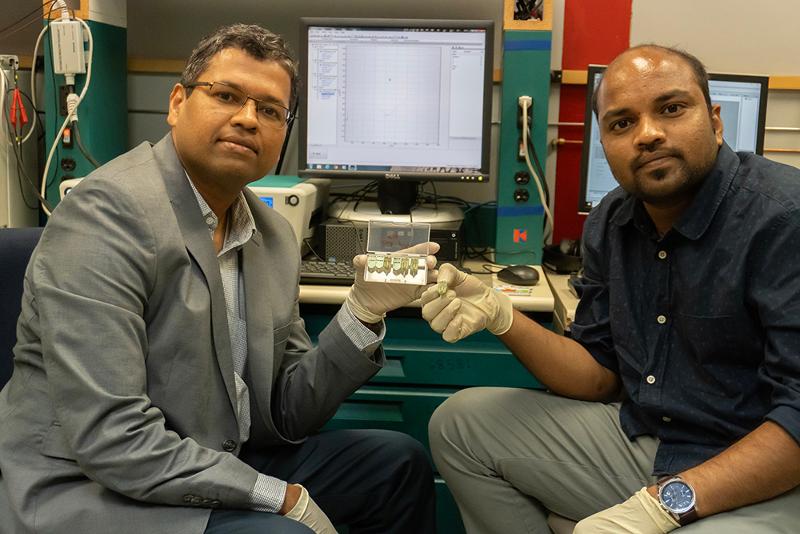Dr. Prabhu Arumugam, an Associate Professor of Mechanical Engineering at Louisiana Tech University, is making groundbreaking strides in the field of neuroscience with his development of implantable biosensor neural probes. These innovative probes have the potential to revolutionize our understanding of the human brain and lead to transformative advancements in the treatment of neurological disorders such as epilepsy, dementia, and Parkinson's Disease. Let's delve into the details of Dr. Arumugam's research and the impact it could have on the future of neuroscience.
Innovative Development of Implantable Biosensor Neural Probes
Learn about the groundbreaking development of implantable biosensor neural probes and their potential to revolutionize neuroscience.
Dr. Prabhu Arumugam's research focuses on the innovative development of implantable biosensor neural probes. These probes are designed to monitor neurochemical activity in the brain, providing valuable insights into neurological disorders and potential treatment options.
By combining microarray probe technology with microfluidic delivery methods, Dr. Arumugam and his team have created a more robust and efficient neural probe. This breakthrough technology has the potential to revolutionize our understanding of the human brain and open doors to new and more effective treatments for neurological disorders.
Collaborative Efforts and Research Partnerships
Explore the collaborative efforts and research partnerships involved in the development of implantable biosensor neural probes.
Dr. Arumugam's research is a collaborative effort that involves multiple disciplines and research partners. He works closely with Dr. Teresa Murray and Dr. Shabnam Siddiqui, experts in chemical and biomedical engineering and rehabilitation science, to improve probe performance in animal models.
In addition to academic collaborations, industry partners such as Alcorix Co and NeuroNexus play a crucial role in microfabricating, packaging, and distributing the final product. These partnerships highlight the practical applications and commercial potential of the implantable biosensor neural probes.
Revolutionizing Neurological Disorder Treatments
Discover how implantable biosensor neural probes have the potential to revolutionize the treatment of neurological disorders.
The development of implantable biosensor neural probes has the potential to transform the treatment of neurological disorders such as epilepsy, dementia, and Parkinson's Disease. These probes provide real-time monitoring of neurochemical activity, allowing for more precise diagnosis and personalized treatment approaches.
With the improved understanding of neurochemical processes and the ability to target specific areas of the brain, researchers can develop more effective treatments that minimize side effects and improve patient outcomes. The future of neurological disorder treatments looks promising with the advancements made in implantable biosensor neural probes.
Implications for Future Neuroscience Research
Explore the implications of implantable biosensor neural probes for future neuroscience research.
The development of implantable biosensor neural probes opens up new possibilities for future neuroscience research. Researchers can gain unprecedented insights into the complexities of the human brain, paving the way for advancements in understanding cognition, behavior, and neurological disorders.
By combining the expertise of researchers from various fields and fostering collaboration between academia and industry, Louisiana Tech University is at the forefront of driving innovation in neuroscience. The potential impact of implantable biosensor neural probes extends beyond the laboratory, with the potential to improve the lives of individuals affected by neurological disorders.
Conclusion
Dr. Prabhu Arumugam's research on implantable biosensor neural probes represents a significant breakthrough in the field of neuroscience. These innovative probes have the potential to revolutionize our understanding of the human brain and pave the way for more effective treatments of neurological disorders.
Through collaborative efforts and research partnerships, Dr. Arumugam and his team have developed a more robust and efficient neural probe that can monitor neurochemical activity in real-time. This technology holds promise for the future of neuroscience research and has the potential to improve the lives of individuals affected by neurological disorders.
FQA :
How do implantable biosensor neural probes work?
Implantable biosensor neural probes are designed to monitor neurochemical activity in the brain. They use microarray probe technology and microfluidic delivery methods to provide real-time data on brain function.
What are the potential applications of implantable biosensor neural probes?
Implantable biosensor neural probes have the potential to revolutionize the treatment of neurological disorders such as epilepsy, dementia, and Parkinson's Disease. They can provide more precise diagnosis and personalized treatment approaches.
How are industry partners involved in the development of these probes?
Industry partners such as Alcorix Co and NeuroNexus play a crucial role in microfabricating, packaging, and distributing the final product. Their involvement highlights the practical applications and commercial potential of the implantable biosensor neural probes.

